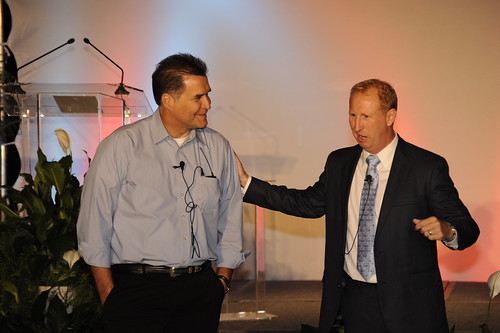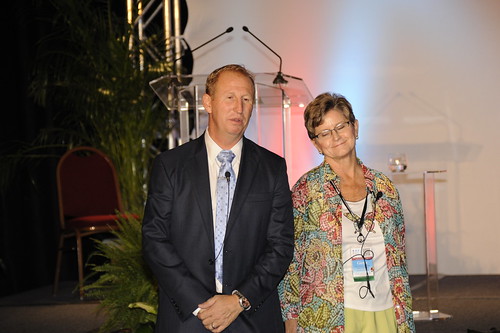


A classically trained actor and comedian, Steve Shenbaum has successfully transferred key performance concepts like improvisation, presentation skills and appropriate humor into communication and self-awareness training for the athletic and corporate environments. This interactive style keeps participants on their feet in a safe and fun learning environment where laughter is the bonding element. Steve currently serves as President of game on, based at the world famous Bollettieri/IMG Academies in Bradenton, FL, and travels throughout the world leading seminars showcasing the power of honesty, humility and humor.
“I want to take humor back, redefine what humor means. It’s been tainted and taken away from us. Human beings are interesting; stories are an authentic and sincere way to connect with people.”
Steve’s nuggets of wisdom and interactive session engaged the entire audience and kept us on the edge of our chairs to see what he would do next and how it would all tie together.
Please note that many of the quotes are paraphrased.
Steve broke the ice with a story about himself:
In high school, he was a second baseman. He really wanted to be shortstop, but the shortstop had more swagger, was a little taller and a little better looking. One day he was brought in to pitch. He nervously took the mound and immediately walked four batters in a row with no strikes. That’s 16 bad pitches in a row.
He thought to himself, “I’m not doing something right.” (laughter) “I didn’t expect laughter on that one… note to self, add to next speech. I wrote that on my hand with my invisible pen.” (more laughter)
Coach pulls him aside: “Do you know what you need to do?”
“No.”
“Throw strikes.” (laugher)
Throughout the entire session, Steve laughs with himself. He not only explains the importance of creating an environment where the other person feels comfortable and trusts that you have their back, but he demonstrates it consistently. One awkward situation after another finds audience members comfortable in front of the entire room after being pulled up unexpectedly and laughing at their own mistakes.
“Smile more.”
He asks the audience to stand; “We’re not doing trust falls, just stand.” (laughter) “I promise I won’t set you up to look like a fool. Humor is about connecting with each other.”
First game – Counting
Steve and his volunteer, Erin, count to 3 alternating.
Erin: 1
Steve: 2
Erin: 3
Steve: 1
Erin: 2… until one of them goofs up.
Do it with your partner… “Warning, you’re going to be looking at someone longer than you’re normally comfortable looking at them.” (laughter)
Ok, do the same thing, but clap on 1. Clap, 2, 3.
Taking care of each other is also about explaining it so that your partner will succeed. “I might even get crazy with it and smile.” He inserts a big grin on the clap.
“Look what’s happening… it’s called laughter.”
This time snap on 2…. add a little flair and have fun with it. 1, snap, 3. “When Erin and I do it, watch our faces and tones.”
“What if this was all that I did and left?” (laughter)
Audience go. 1, 2, step on 3.
You need to warm up before speaking or a business day that starts at 8am. Now we’re warmed up and comfortable with each other. Let’s begin the day.
When I first came up with the game, I thought, “This is stupid. Me, the creator, thinks this is stupid. How do I do this with esteemed politicians? Wait, did I just say ‘esteemed’ and ‘politicians’ in the same sentence? My bad.” (laughter)
No matter what the game or situation is, enter it with an attitude of doing the best you can instead of being hesitant or thinking it’s pointless.
When we interact with our clients and employees, we are losing the ability to just say “hello.” Steve says hi to random members of the audience in a rehearsed, bored sounding voice. This doesn’t resonate as authentic to build a connection. Be genuine.
Next game: Expert Speaker Interview
3 rules:
1. Everything the volunteer says in interview is correct, and I’ll agree with them
2. Everything I say is correct, and they must also agree with me
3. I must take care of you and you must take care of me
Try to be as sincere as possible, and set your partner up for success by putting them in positions in the conversation that make them look good.
The audience picks the expert topic (intentionally something neither of them could possibly be experts on): nano particles in medicine.
Remember: you want him to do well because he’s a colleague…. and most of you are glad I didn’t pick you. (laugher)
Steve: “Introducing: Dr. of the Sky. Where are you from?”
Volunteer Danny: “I am from a test tube.”
Steve: “How did you develop the nano particle community?”
D: “There were thousands of beakers.”
S: “We loved your first book, Beakers Coming Together. How did you get them to work together?”
D: “Etrade.”
S: “What’s the first class a college student should take?”
D: “Introduction to Nano Particles in Medicine.”
S: “Never saw that coming. Let’s say I’m a particle. How do you get me to separate?”
D: “It defies logic. You have to tell them, “separate.””
S: “Your last book, Separate Oh Particle, Separate, was great! Where is nano particle technology going?”
D: “That’s why I’m here, to promote our next step. And what is that next step? We want to go to Mars.”
Give specific feedback:
Steve: “You did such a nice job of buying in. And I loved your smile.”
Audience: Danny did a good job of picking up on your cues to respond. He had great timing. Like, he should be you. (volunteer Danny motions for speaker to go take a seat in the audience). (laughter)
Steve’s takeaway: This is about creating an environment. Create one where I’ve got your back, you’ve got my back, and I’ll take care of you. This creates an environment of opportunity. I challenge you all to be experts in that. Don’t always say “yes.” When a client says I don’t know how to tweet, you say, “I’ve got your back, I’ll take you there.” This is much more reassuring than, “Let me try to figure this out and I’ll let you know.” Be an expert in the brand you represent. When you’re in a job/college interview, there’s one true topic: you. And you’re an expert in you.
Next game: Coins
Coins are things that we value, that make us smile, are hobbies, families, faith, language, traveling, food, music, your dreams, accomplishments – the things that you value about yourself that have absolutely nothing to do with what you do for a living.
Scene:
“What’s your name, where you from, what do you do for a living”… repeats quickly several times in mundane tone. (laughter)
The things that make you smile that have nothing to do with what you do for a living.
When he used to interview as an actor, all Steve could focus on was that the room was full of the people who had the ticket to the things he wanted, and he idolized them, knowing that the key to all of his dreams and hopes rested in them. He would stand outside the door with absolutely no direction except that he want to “wow” them, want them to love him so much.
Steve: (in urgent, fast, hyper manner) “Hey how you doing? Doing good, great, WOOOOO. Wow, it’s cold in here, you’re hot.”
“And I was cast as an elf twice. (laughter) Funny now, not funny then.”
Steve’s coins: California, my brother the firefighter, In and Out Burger, mom’s an artist, warm weather, old school hip hop music.
1st stage: have coins
2nd stage: be a coin collector. Once you have yours, see what other people’s coins are, and ask them about them.
3rd stage comes naturally: See what coins you have in common; make a connection.
Same rules as last game, except imaginary lines dividing the stage. One side is 8, the other is is 3. 8 is the side of us that’s certain, takes charge, has a louder voice, conveys body language of being in control, you lead the scene, are powerful, are the leader.
3 is more reserved, the listener, follower, more laid back.
Steve and his volunteer act out a scene where he is chastising his 13-year-old daughter for wearing high heels to school. Throughout the scene, they switch sides, and consequently, attitudes. She is complacent as a 3 while he lectures her and more confident and stands her ground when she is standing on the 8 side. Their body language, tone of voice and choice of words adjust accordingly.
There are times in our interactions where we’re going to be the 8 in the room, clearly, and there’s no reason to try to be more than that. Sometimes we’re a 5 and find the middle ground, not going too fast or too slow. But sometimes being a 3 is so valuable: to lay back, listen, slow down, take in information. I don’t have lightbulb “AHA” moments as much when an I’m an 8 as when I’m a 3.
Know when your client needs to be the 8. Two 8s in the room together don’t always get to a solution. “Awesome, great idea, awesome to you, awesomer.” It’s up to you to find when you naturally belong in one role or the other. You need to know what the other person that you’re communicating with needs.
Last game – find when to be over-the-top and when to back off
Steve and a volunteer answer audience questions one word at a time, taking turns to tell story together. The goal is to get to end of the sentence with clarity, and their mutual objectives are to make each other feel comfortable.
“When your sweaty hands start going, think of my sweaty hands. It’s hard to think of yours when you’re thinking of mine.”
They infuse words such as “the” and “and” in their sentences where you would traditionally not use them, but it gives your partner time to think and catch on to the direction that you’re going with the sentences that you’re putting together in tandom.
Say you’re hiring a strength and conditioning coach. He’s puffing on a cigarette the first day you meet him; this is not the one that you want to hire. He doesn’t need to be perfect, but should have expertise in area you’re looking for expertise. Your clients want their PR people to say, “I’ve got you, got your back, going to take care of you, your name and your brand with grace and expertise.” That’s a PR person you want. Being an expert of yourself isn’t arrogance.
People don’t have public speaking problems; they have fear of reaction they’ll get if they don’t do it right. It didn’t matter when the volunteers made mistakes earlier because they felt comfortable and trusted us not to make fun of them.
Steve’s takeaways:
Find your energy; know when to be big, be small, be in the middle; know what client wants.
Have coins; you know I’m not going to embarrass you. I’m not an “uh”and “and” guy, but I’ll use them to slow the conversation down for you. It’s a bounce pass.
When we’re using social media – this incredibly powerful vehicle – to send a message, take care of ourselves and our clients, and put care into driving message with clarity and excellence. This may mean holding off on automatic tweets or making more money in name of excellence.
As you present in any way, shape or form, ask yourself, “Is what I’m messaging reflective of my values – words, online, how I carry myself, my values, my coins?”It’s up to us to send messages with honesty, humility & humor. Overall, message with excellence.
